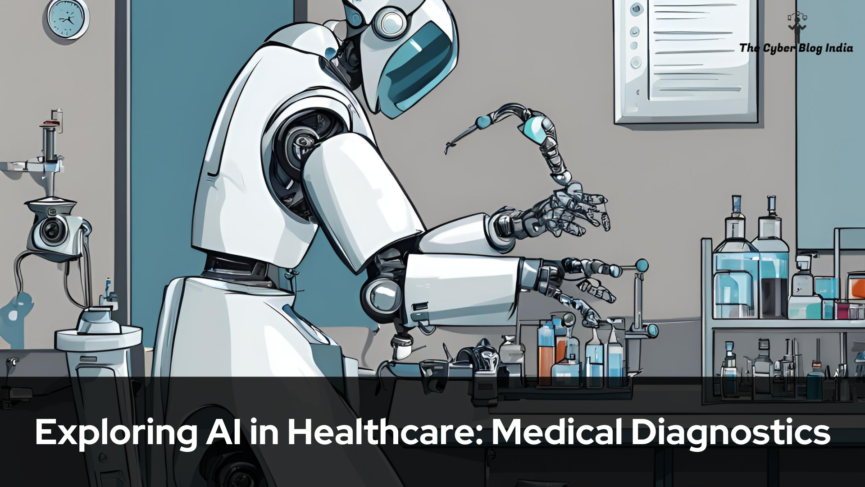Exploring AI in Healthcare: Medical Diagnostics

In the ever-evolving dynamics of innovation across diverse fields, Artificial Intelligence (AI) has shown immense potential in the healthcare industry. Medical diagnosis is one such prime example of promising results. It is a process of evaluation of medical conditions or diseases. AI has the potential to aid healthcare professions, offering a promising alternative to traditional methods for enhancing diagnostic accuracy. This article explores the application of AI in the healthcare industry with a focus on medical diagnosis.
Conventional Methodology of Medical Diagnosis and AI
Medical diagnosis relies upon human labour in its conventional sense. It generally involves a large chunk of data and processing of input information. Doing it manually is a time-consuming process. A medical professional carefully analyses many factors, such as the patient’s symptoms, medical history, timeline, etc. A wide range of diagnostic tests supplement this process.
Examples of diagnostic tests include imaging tests, blood tests, and biopsy procedures. However, human error, variability in expertise, and time constraints can lead to misdiagnosis or delayed diagnosis. As a result, this can have significant implications for a patient’s health. This sets the stage for autonomous systems to enter the sphere, assist, and accelerate the process.
AI is an algorithm-based software that enables agents, such as robots, to use information to solve problems. From a broader perspective, there are two main types of AI systems: 1) expert systems that are better at decision-making than humans, and; 2) machine learning systems that can process vast amounts of data and derive findings. In medical diagnostics, AI can use support vector machines, classification trees, and artificial neural networks to facilitate clinical diagnosis of severe acute and chronic illnesses such as Alzheimer’s disease.
Real-life Examples
Apple’s Watch features a groundbreaking application of AI capable of detecting irregular heart rates. AI algorithms in wearable devices allow for real-time monitoring of vital signs such as heart rate and rhythm. This enables early diagnosis of diseases such as atrial fibrillation (AFib). This proactive approach to health monitoring enhances patient outcomes and potentially prevents life-threatening events while significantly improving overall well-being. Big tech giants such as Microsoft, IBM’s Watson, and Google have undertaken significant initiatives to exploit AI in developing their medical diagnostic systems.
In 2016, Manipal Hospitals partnered with IBM to deploy Watson for Oncology, an AI-powered cognitive computing platform to assist oncologists in providing personalised cancer treatment recommendations. This platform analyses vast amounts of medical literature, patient records, and clinical trial data to offer evidence-based treatment options tailored to individual patients’ specific characteristics and medical history. By leveraging AI algorithms, this system augments the oncologists’ expertise, enabling them to make more informed treatment decisions and improve outcomes in the fight against cancer.
DeepMind collaborated with an Indian healthcare provider to tackle the challenges posed by diabetic retinopathy, a leading cause of blindness. By analysing retina scans with AI algorithms, DeepMind’s technology assists clinicians in early detection and intervention. In addition, AI enhances healthcare accessibility and efficiency, particularly in underserved areas or regions with a shortage of healthcare professionals. Telemedicine platforms with AI-powered diagnostic tools can connect patients with remote healthcare providers, allowing for timely diagnosis and treatment without needing in-person visits.
These examples show how AI can be integrated into clinical practice to enhance medical diagnosis and treatment in real-world healthcare settings.
Existing Challenges and Concerns
Despite immense potential, integrating AI into medical diagnosis is not without challenges and concerns. Privacy is one of the primary concerns with AI systems in diagnostics. Training AI systems requires access to large amounts of patients’ personal and sensitive data, which raises eyebrows. Hence, there is a need to ensure the reliability and safety of AI algorithms.
Another challenge is labelling all the requisite data beforehand, as well as its practical aspects and possible interpretations of data. Bias in training data also perpetuates bias in an AI system, as AI relies on data for training and validation. There is also a risk of error in outcomes due to incomplete, unrepresentative, or poor-quality data, potentially leading to unfair diagnosis.
Moreover, ethical and regulatory considerations surround the use of AI in healthcare, including consent and liability issues. Healthcare organisations must navigate these complexities carefully to ensure responsible and ethical deployment of AI technologies, with patients’ best interests at the forefront.
Conclusion
AI holds immense potential for improving medical diagnosis by its application in the healthcare industry. By utilising the power of AI, the efficiency and innovation in this domain can reach new heights and ultimately improve patient outcomes. AI-driven advancements, such as a wearable device capable of detecting cardiac arrests, have transformed traditional approaches to medical diagnosis.
However, any innovative tool can be a boon only when dealt with caution and care and not let backfire. This can be ensured by addressing the existing loopholes and challenges in the system and addressing technical, ethical, and regulatory challenges effectively. Privacy concerns surrounding the collection and use of patient data, the reliability and safety of AI algorithms, and liability issues in the event of diagnostic errors or adverse outcomes must be carefully addressed to ensure responsible deployment of AI technologies in healthcare. With careful consideration and responsible implementation, AI can be a total game-changer. It can help humans experience the miracles of science and innovation in medical diagnosis and pave the way for a healthier and more innovative future. AI represents a powerful tool that can unlock new possibilities in medical diagnosis and healthcare service delivery when wielded with caution and care.
